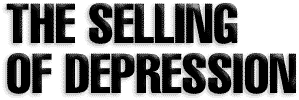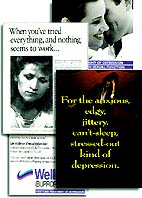
|


Federal Funding
Promotes a New
“Epidemic”
By Thomas G. Whittle and Jan Thorpe


rom the viewpoint of the psychiatric industry, you may have a devastating and possibly even deadly disease – even though you detect no signs of illness.
The same may be true for your spouse. Or your child. Or many of your friends. Or for an estimated 55 percent of the United States populace.
The “disease” is depression.
The “depression epidemic” appears to be everywhere – on television and radio, in newspapers and magazines. Ads are ubiquitous; strategically placed articles show a fine-tuned marketing and public relations strategy at work. Treatments – various drugs and therapies including electroshock – seem to abound.
Yet it is immediately apparent that something is amiss. A few questions reveal that symptoms of depression can include garden-variety grief and anguish, stemming from such unmysterious causes as the loss of a loved one. And since when was every other person you knew “depressed”? A closer look reveals much, much more. And billions at stake.
A Growth Industry
The keystone of the depression industry is the National Institute of Mental Health. Mass sales of psychiatric “cures” for depression are made possible by vast sums of taxpayer dollars poured by NIMH into “researching” and promoting the concept.
An examination of grants furnished by NIMH – an agency of the federal government located in the Department of Health and Human Services – to the psychiatric industry shows depression research as the largest budgetary item, totaling nearly a third of NIMH’s $604-million annual expenditures.
But Freedom found that NIMH’s activities regarding depression extended far beyond the research that is supposedly its “mission.”
An investigation uncovered that NIMH has awarded federal funds to a public relations firm to conduct a multi-year national PR campaign to promote depression – a campaign which neither the PR firm nor NIMH were willing to discuss.

According to information obtained by Freedom, Professional Media Services Inc. (PMSI), of Newton, Massachusetts, received at least $1 million from NIMH in 1993 and 1995 alone. PMSI specializes in public service announcements for radio and television, and similar notices for magazines and newspapers.
If a past campaign by PMSI on behalf of the Department of Housing and Urban Development is any measure of the extent of its current efforts on behalf of depression, at least 400 television stations, 1,350 radio stations, and 2,500 magazines and newspapers have carried NIMH’s message.
Unlike other NIMH grants that can be readily viewed in the NIMH contracts and grants data base, however, no information is provided regarding grants to PMSI. No summary or abstract is on file regarding strategy or procedures to be employed. The information available on the data base, unlike other entries, is cryptic and terse: “Public education campaign on depression.”
Seeking to learn more, Freedom called PMSI. While the firm’s receptionist acknowledged that it runs the PR campaign for NIMH, attempts to obtain further information encountered sharp counter-questioning by the president of the firm, Linda Janower, via the receptionist. Janower, who declined to speak on the phone herself, sought to discover how Freedom had found out about her company and its campaign.
Through the receptionist, Janower made the unusual demand that the researcher send a resume and cover letter describing his reason for wanting to know about the campaign. These were sent to Janower, but still no response was received.
In a similar vein, NIMH spokesperson Constance Burr balked at answering questions about the PR campaign or about NIMH payments to PMSI.
When asked whether NIMH was permitted by law to spend taxpayer money allocated for research purposes to hire a PR firm to promote depression, Burr became flustered. She then read aloud portions of the NIMH “mission statement” – a document which contains no mention of promotion or public relations.
You Can Become a Candidate for Drugs or Shock
With armies of lavishly equipped sales and marketing personnel swarming around America’s medical doctors, and barrages of multi-media advertisements aimed at consumers, the psychiatric architects of the depression war seek to get as many people as possible labeled “depressed.” These then join the ranks of candidates for the treatments: drugs and/or electric shock.
Freedom probed further.
Turning to the Internet, an “Online Depression Screening Test” was discovered, published by the New York University Department of Psychiatry.
Headed “Are You Depressed?”, the test contains 10 benign questions which could be answered affirmatively by virtually anyone. Almost anybody taking the test would find it hard not to be classified as “depressed.”
Drug companies also created a “national depression screening day,” held in October each year, conveniently following the arrival on the market of the latest line of antidepressants. These drugs, pumped as “more effective” and “producing less side effects,” are now among the most lucrative substances on the market, with some individual products grossing billions of dollars per year.
In the United States alone, 43 million prescriptions were written in 1995 for one type of antidepressant alone, known as serotonin reuptake inhibitors. These substances, such as Effexor and Prozac, prevent the brain from reabsorbing a neurotransmitter1 known as serotonin. No one knows exactly how they do this and, far more importantly, no one knows what the long-term harm of altering the brain’s subtle chemistry in this manner will be.
Numbers Game
Many figures are offered by psychiatric spokespersons concerning how many Americans are “depressed.” These statistics are fed to news media with the message that those afflicted ought to seek “professional help.” Such “help” normally turns out to be what is easiest for psychiatrists to deliver and “therapies” for which they are equipped: brain-damaging psychiatric drugs or electro-convulsive shock.
Depending on what psychiatric “expert” you ask, and when, the “depressed American” constitutes from 3 to 13 to 20 to 55 percent of the population. These percentages represent vast discrepancies, from 7.5 million to 137 million Americans. These figures come from psychiatric and psychological studies, and also from newspaper stories based on psychiatric pronouncements.
It is obvious that a numbers game is being played and that figures offered by psychiatric authorities, including NIMH, are unreliable. The trend is inevitably toward larger and larger statistics. If depression is “pervasive,” it of course justifies massive “education” campaigns by drug companies, the psychiatric industry – and our own federal government.
A closely related area in which people have been fed false information – under the guise of “education” – is revelatory of a psychiatric hoax: That drugs are a “cure.”
While psychiatrists prescribe antidepressants most frequently, many medical doctors, inundated with advertisers’ literature, free samples and so forth, today shovel out these deadly drugs – a departure from the time-honored tradition of actually diagnosing an individual’s underlying physical condition. Freedom documented one example where a doctor offered an antidepressant as “treatment” to relieve a person’s headaches, when the patient actually had an undiagnosed broken neck.
According to Dr. John Sommers-Flanagan of the University of Montana, misdiagnosing occurs frequently – one of the reasons the number of supposedly depressed people appears so high.
Sommers-Flanagan cautioned, “Depression is so easily confused with sadness and unhappiness.” He attributed the confusion to the broad-scale promotion of depression by the American Psychiatric Association and pharmaceutical companies.
His insight into the hit-or-miss manner in which antidepressants are dispensed cuts to the heart of the problem and shows that the diagnosis of “depression” is neither scientific nor medical in nature. “The prescribing of antidepressants takes an experimental approach,” he said. “It is a trial-and-error procedure.”
Physicians, he noted, tend to have a “favorite” antidepressant, which they almost invariably prescribe first. When their pet drug doesn’t work, they prescribe another, and then another, until they run through the gamut of antidepressants or the patient quits.
According to Dr. Roger Greenberg of the State University of New York’s Upstate Medical Center in Syracuse, no scientific validity exists with regard to which antidepressant should be prescribed. As one researcher put it, “It’s a crapshoot.”
The Selling of Depression continued...
|

|






